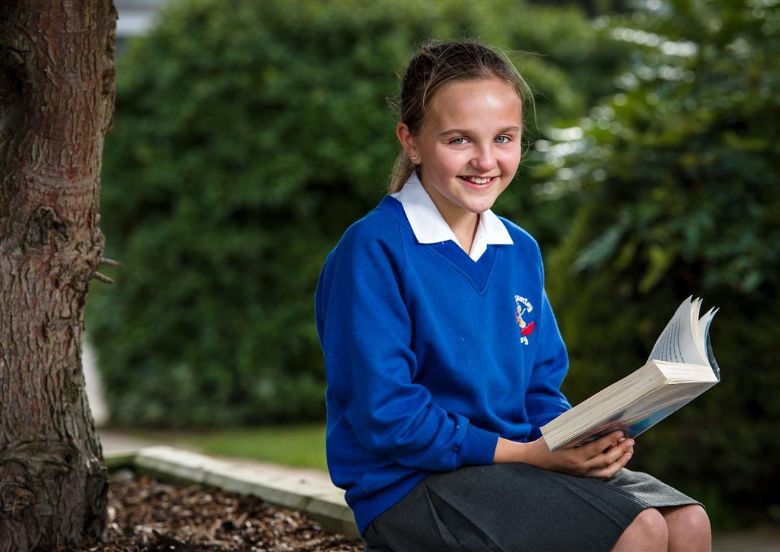English

All things are possible for one who believes – Mark 9:23
English Vision Statement
At Waverley Abbey we recognise the central importance of English as a medium for thought, learning and expression across the curriculum and also as a subject in its own right. We believe that children need to develop their use of language in order to learn and to play a full and active role as individuals within society. We see the need to acquire and develop language skills as a major part of the school curriculum. We believe that, through English lessons, children can develop a positive growth mind-set as they begin to relish challenges and are guided to self-reflect. English is therefore given a high priority in school and is taught daily in every class.
Curriculum Intent:
We aim to ensure that our pupils develop a love of language through a range of high-quality texts. We see the need to acquire and develop language skills as a major part of the school curriculum. We want our children to be able to write for a range of purposes and audiences and take ownership of their writing. Careful links are made across the curriculum to ensure that writing is meaningful and skills are transferrable. We aim to make reading and writing an enjoyable experience which develops our pupils into thoughtful, creative and confident writers. English is a multi-dimensional subject and at Waverley Abbey Junior School we provide a curriculum that successfully encompasses each individual’s needs.
Implementation
Reading (including phonics)
Reading is taught in the week following the VIPERS acronym (vocabulary, inference, prediction, explanation, retrieval and summarise). Each session focusses on developing one or more of these skills whilst also allowing children to develop fluency and accuracy when reading. A wide range of effective questioning is used during class discussions to challenge and extend a pupil’s understanding. All classes have dedicated quiet reading time every day to allow pupils to enjoy reading for pleasure. Throughout the week, pupils are encouraged to share their book recommendations and talk about what they are reading. Every child is invited to take part in our school’s reading challenge. The class in each year group who have read the highest number of books in a 2-week period wins the year group’s reading trophy that week. High quality texts are read and studied throughout school during reading and English lessons. These texts are key to unlocking a world of wonder for our pupils. They aim to inspire and motivate all learners. Each class has a reading area which inspires pupils to read a wide range of high-quality, diverse texts. All children are encouraged to read at least 3 times a week at home either to themselves or to an adult. Reading at home is recorded in the children’s reading records or homework diaries/planners. Story time is part of every class’ daily timetable. During story time, pupils are encouraged to listen to their teacher read a whole class text that all learners can enjoy. When pupils start in Y3, their phonics knowledge is assessed. Those that require further phonics instruction will have daily phonics lessons, following the Monster Phonics programme. These pupils are given decodable Monster Phonics books to take home and read. They will also read 3-5 times a week to an adult in school. Following this, children may be assessed for reading fluency and accuracy and may receive a book-band reading book before becoming free readers. For children who need further support in reading, they may join a fluency intervention or have 1:1 explicit instruction through an intervention programme such as Literacy For All or AcceleRead AcceleWrite.
Handwriting
All pupils are expected to write using a joined – up handwriting style. This must be legible and from Year 4 onwards it is expected that pupils will write in ink pen. Handwriting is taught and practised in all year groups following the Nelson handwriting scheme.
Writing
At Waverley Abbey, pupils are taught on a three-week cycle of imitate, innovate and invent. They complete an extended piece of writing at the end of each taught unit. Pupils consider the audience and purpose of their writing through discussion of a text/genre's main features. This then enables them to create or share write their own success criteria. They are then required to edit their own work. The children are expected, in all year groups, to take responsibility for their own editing and this includes finding and correcting their own punctuation and spelling; using a thesaurus to improve vocabulary and word choices; and on many occasions – publishing a finished piece of work with presentation and handwriting skills as a focus. Grammar is taught weekly in all year groups and children are encouraged to use what they have learnt in their writing. Spelling is taught weekly through stand-alone spelling lessons based on The Spelling Book, as well as through starters in English lessons. Children are given tasks to encourage and enable them to commit these spellings to their long-term-memory.
Oracy
We prioritise the development of pupils' speaking and listening skills, recognising their importance in effective communication. Opportunities for class discussions, debates, and presentations are embedded across the curriculum. We encourage active listening, mutual respect, and effective communication skills, nurturing pupils' confidence and ability to express their ideas articulately.
Impact
Pupils at Waverley Abbey demonstrate strong academic outcomes in English. They make excellent progress in their reading, writing and oracy skills throughout their time with us. Pupils display a high level of engagement and motivation in English. They actively participate in lessons, develop a love for reading and demonstrate enthusiasm for writing tasks. Pupils develop a wide vocabulary at Waverley Abbey. They have a secure understanding of grammar, punctuation and spelling rules which is reflected in their writing. Our English curriculum fosters confident, resilient and independent learners who take pride in their work and apply their skills across the curriculum. Pupils are reflective and have a desire to continuously improve.
If you would like to find out more about the curriculum please make an appointment to see your child's teacher who will be happy to discuss this with you, you can do this by contacting school through the office via - info@waverley-abbey.surrey.sch.uk
